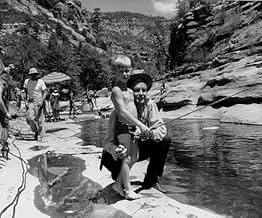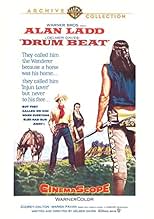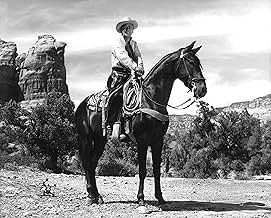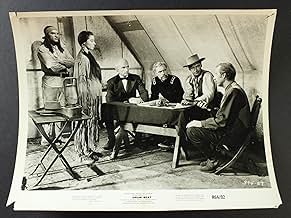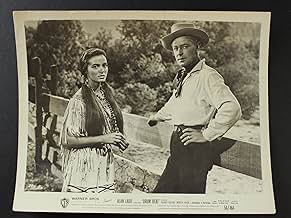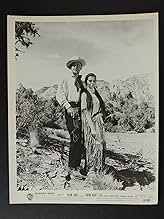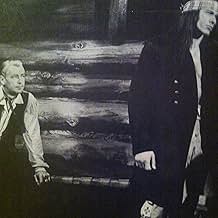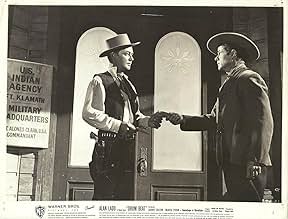Nel 1872, il combattente indiano Johnny MacKay viene nominato commissario per la pace per il territorio della California e dell'Oregon, ma deve affrontare la dura opposizione dei Modoc, rinn... Leggi tuttoNel 1872, il combattente indiano Johnny MacKay viene nominato commissario per la pace per il territorio della California e dell'Oregon, ma deve affrontare la dura opposizione dei Modoc, rinnegati guidati dal loro capo capitano Jack.Nel 1872, il combattente indiano Johnny MacKay viene nominato commissario per la pace per il territorio della California e dell'Oregon, ma deve affrontare la dura opposizione dei Modoc, rinnegati guidati dal loro capo capitano Jack.
- Regia
- Sceneggiatura
- Star
- Modoc Jim
- (as Frank de Kova)
- Capt. Alonzo Clark
- (as George Lewis)
Trama
Lo sapevi?
- QuizActor Charles Buchinsky (his birth name) changed his name to Charles Bronson, using his new moniker for the first time in this film, and remained so for the rest of his acting career.
- BlooperPresident Grant is shown wearing his Army uniform in the White House. This is inaccurate as General Grant resigned his commission in 1869.
- Citazioni
Dr. Thomas: Don't you feel like a murderer?
Johnny MacKay: No, sir.
Dr. Thomas: Shouldn't you?
Johnny MacKay: I've never shot anyone without cause. My job is to protect the wagon train. When somebody shoots at my people, I shoot back.
- ConnessioniFeatured in The Good Life (2007)
Alan Ladd is Indian fighter Johnny Mackay, who is ordered by President Ulysses Grant (Hayden Rorke) to negotiate with the Modoc Indians in an attempt to avert war...
Utterly frustrating! One of the most attractive looking Westerns of the fifties, Daves' movie doesn't quite have the courage of its convictions. The core basis of the film is sound, though as we are told from the off, it features fictionalised enhancements to further dramatic impact. Snatching from a little known part of the Indian Wars from 1872/3 (to be applauded), that of the Modoc Uprising, film is set in 1869 around the Oregon-California border. Plot and story are put in place neatly, where the characters are interesting, the back drop of various Arizona locations is simply in "scope" gorgeous, and the narrative promises some boldness as the first person killed is an innocent woman and the white man protagonists are fuelled by anger and hatred. But...
Unfortunately with a running time of one hour and fifty minutes, many passages of chatter never really expand the characters. Something which is not usually applicable to Delmer Daves when he was on form. We should be getting high grade dramatic worth from the principle players, their conversations should ping with emotion and depth, after being set up as people with voices to be heard, we never get a real grasp of Mackay's inner conflict, or Captain Jack's (Bronson) staunch loyalty to his cause, or even the depth and reasoning of Bill Satterwhite's (Keith) hatred. While there is, as the historians will tell you, a severe dilution of the story to suit the white man's cause. It's hard to believe this is the same director of Broken Arrow from four years earlier! But then Daves wasn't writing the screenplay....
Maybe Daves felt he needed to better the screenplay for Broken Arrow? To show he could put down on the page some "liberal" quality as well as directing? He would prove post Drum Beat that he could "co-write" great Western screenplays (Jubal/White Feather/The Last Wagon), but here on his own he falls short. Not only does it skulk in the shadow of Broken Arrow, it also pales into insignificance to Anthony Mann's brilliant Devil's Doorway, which was also from 1950. You can feel Daves striving for relevance in the mid fifties, but he is trumped by narrative zest elsewhere, a shame since the acting performances and production quality make Drum Beat very watchable.
Visually it's superb, Sedona's various natural beauties are excellently captured by Peverell Marley (The Left Handed Gun/Westbound), while Daves proves adept at utilising the landscapes as part of his action sequences (check out the red rock rifle engagement scene). Young's score is a goodie, blending bombastic beats with ballad strains, and the Warnercolor is gorgeous, one of the better Warnercolor productions that I have seen. Acting wise it's Bronson's movie, physically perfect and featuring a shifty aggressive ebullience that's most appealing. Ladd scores well, too, nicely underplayed at the critical moments, Keith has a thespian quality that suits the role of an Indian hating aggressor, and Elisha Cook provides weasel smarts that make us yearn for his part to have been bigger.
Some have questioned why this isn't better known or worthy of a widespread home format release? The answer is that simply it has more style than substance, and Daves, as much as us Western fans love him, is to blame from a writing perspective. Visually and aurally the film ranks a comfortable 9/10. As a whole, sadly, it rounds out as 6.5/10.
- hitchcockthelegend
- 18 set 2012
- Permalink
I più visti
- How long is Drum Beat?Powered by Alexa
Dettagli
Botteghino
- Budget
- 1.100.000 USD (previsto)
- Tempo di esecuzione1 ora 51 minuti
- Proporzioni
- 2.55 : 1
Contribuisci a questa pagina


